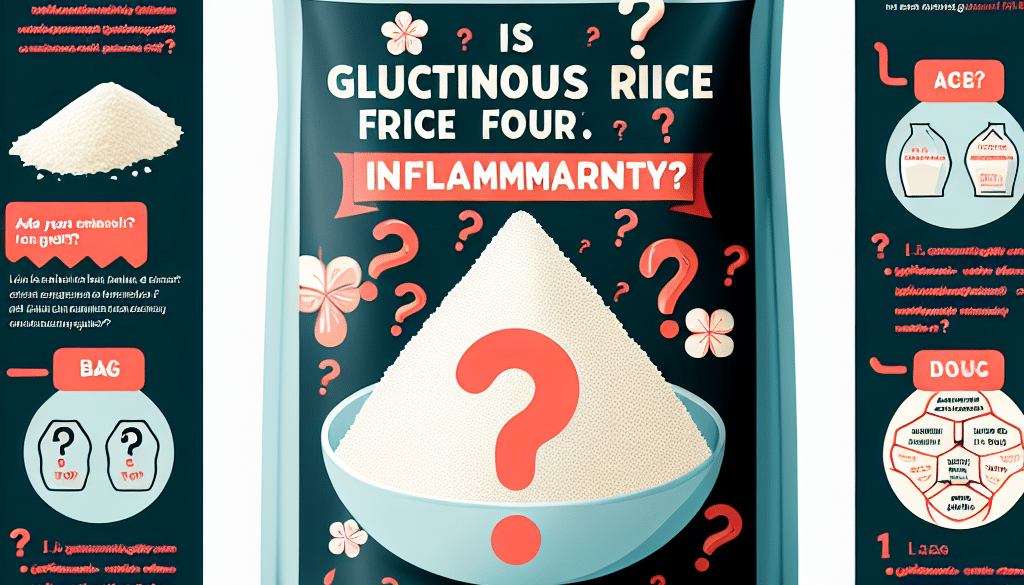Is Glutinous Rice Flour Inflammatory?
-
Table of Contents
- Glutinous Rice Flour: Is It an Inflammatory Ingredient?
- Understanding Inflammation and Diet
- Composition of Glutinous Rice Flour
- Research on Glutinous Rice Flour and Inflammation
- Glutinous Rice Flour in a Balanced Diet
- Alternatives to Glutinous Rice Flour
- Case Studies and Statistics
- Conclusion: Balancing the Evidence
- Discover ETprotein’s Range of Protein Products
Glutinous Rice Flour: Is It an Inflammatory Ingredient?

Glutinous rice flour, also known as sweet rice flour, is a staple ingredient in many Asian cuisines. It is derived from glutinous rice, which, despite its name, does not contain gluten. Instead, it is called “glutinous” in the sense of being glue-like or sticky when cooked. This type of rice flour is commonly used in a variety of dishes, from sweet desserts to savory snacks. However, with the increasing focus on health and nutrition, many people are questioning the impact of different foods on their bodies, particularly regarding inflammation. In this article, we will explore whether glutinous rice flour is inflammatory and what the research says about its effects on health.
Understanding Inflammation and Diet
Inflammation is a natural process that occurs in the body as a response to injury or infection. While acute inflammation is beneficial for healing, chronic inflammation can lead to various health issues, including heart disease, diabetes, and autoimmune disorders. Diet plays a significant role in influencing inflammation levels in the body. Foods that are high in sugar, saturated fats, and trans fats are known to promote inflammation, while foods rich in antioxidants and omega-3 fatty acids are considered anti-inflammatory.
Composition of Glutinous Rice Flour
Glutinous rice flour is primarily composed of carbohydrates, with a small amount of protein and virtually no fat. It is also low in fiber compared to whole grain flours. The high carbohydrate content means that it can cause a rapid increase in blood sugar levels, which has been associated with inflammation when consumed in excess. However, the impact of glutinous rice flour on inflammation may also depend on the overall context of the diet and individual health conditions.
Research on Glutinous Rice Flour and Inflammation
There is limited research specifically focusing on glutinous rice flour and its inflammatory effects. However, studies on refined carbohydrates and their impact on health can provide some insights. Refined carbs, which include white rice and products made from rice flour, have been linked to higher levels of inflammatory markers in the blood. This suggests that frequent consumption of glutinous rice flour, especially in large quantities, could potentially contribute to inflammation.
Glutinous Rice Flour in a Balanced Diet
When considering the potential inflammatory effects of glutinous rice flour, it’s important to look at the overall dietary pattern. Consuming glutinous rice flour as part of a balanced diet that includes a variety of fruits, vegetables, lean proteins, and whole grains may mitigate any potential inflammatory response. Additionally, traditional dishes that use glutinous rice flour often combine it with other ingredients that may have anti-inflammatory properties, such as ginger or turmeric.
Alternatives to Glutinous Rice Flour
For those concerned about inflammation, there are several alternatives to glutinous rice flour that may be considered:
- Whole grain flours: These flours are higher in fiber and nutrients and have a lower glycemic index, which may help reduce inflammation.
- Almond flour or coconut flour: These are low-carbohydrate, gluten-free options that also provide healthy fats and fiber.
- Chickpea flour: High in protein and fiber, chickpea flour is a nutritious alternative that may have anti-inflammatory effects.
Case Studies and Statistics
While specific case studies on glutinous rice flour are scarce, broader research on dietary patterns and inflammation provides valuable insights. For example, studies have shown that diets high in refined grains are associated with increased levels of C-reactive protein (CRP), a marker of inflammation in the body. Conversely, diets rich in whole grains and fiber are linked to lower CRP levels.
Conclusion: Balancing the Evidence
In conclusion, while glutinous rice flour is not inherently inflammatory, its high carbohydrate content and low fiber level mean that it could contribute to inflammation when consumed in excess as part of a diet high in refined carbohydrates. To minimize the risk of inflammation, it is advisable to consume glutinous rice flour in moderation and as part of a diverse and balanced diet. Incorporating a variety of anti-inflammatory foods and considering alternative flours can also help maintain a healthy inflammatory response.
Discover ETprotein’s Range of Protein Products
If you’re looking to enhance your diet with high-quality protein sources that may help manage inflammation, consider exploring ETprotein’s range of protein products. ETprotein offers a selection of organic and non-GMO protein powders, including rice protein, pea protein, and other plant-based options. These products can be a valuable addition to a balanced diet, supporting overall health and potentially contributing to a reduced inflammatory response.
About ETprotein:
ETprotein, a reputable protein and L-(+)-Ergothioneine (EGT) Chinese factory manufacturer and supplier, is renowned for producing, stocking, exporting, and delivering the highest quality organic bulk vegan proteins and L-(+)-Ergothioneine. They include Organic rice protein, clear rice protein, pea protein, clear pea protein, watermelon seed protein, pumpkin seed protein, sunflower seed protein, mung bean protein, peanut protein, and L-(+)-Ergothioneine EGT Pharmaceutical grade, L-(+)-Ergothioneine EGT food grade, L-(+)-Ergothioneine EGT cosmetic grade, L-(+)-Ergothioneine EGT reference grade and L-(+)-Ergothioneine EGT standard. Their offerings, characterized by a neutral taste, non-GMO, allergen-free attributes, with L-(+)-Ergothioneine purity over 98%, 99%, cater to a diverse range of industries. They serve nutraceutical, pharmaceutical, cosmeceutical, veterinary, as well as food and beverage finished product distributors, traders, and manufacturers across Europe, USA, Canada, Australia, Thailand, Japan, Korea, Brazil, and Chile, among others.
ETprotein specialization includes exporting and delivering tailor-made protein powder and finished nutritional supplements. Their extensive product range covers sectors like Food and Beverage, Sports Nutrition, Weight Management, Dietary Supplements, Health and Wellness Products, and Infant Formula, ensuring comprehensive solutions to meet all your protein needs.
As a trusted company by leading global food and beverage brands and Fortune 500 companies, ETprotein reinforces China’s reputation in the global arena. For more information or to sample their products, please contact them and email sales(at)ETprotein.com today.












